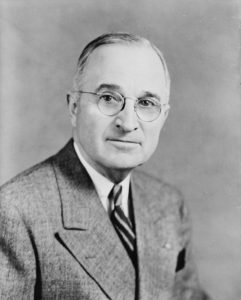Harry Truman: 1945-1952
“Across the Atlantic in the US, news of the civil war in Palestine was to lead to an extraordinary clash at the highest level of government. Secretary of State General George Marshall supported a new US Trusteeship proposal for Palestine. This proposal would delay a final decision about the future of Palestine, would give the UN the responsibility of administering the country, and would guarantee the rights of both communities. Besides, for strictly US national interest, Marshall argued, America should support the Arab camp which held the keys to the most strategic natural resource: oil. So, less than four months after the US delegation had voted yes for partition at the UN, the State Department instructed its delegation at the UN General Assembly, which reconvened on March 19 at Arab request to discuss Palestine, to reverse its position and opt for trusteeship.
For President Truman, this reversal of his position undermined the promise he had given to Zionist leader Chaim Weizmann on November 19, 1947. On his calendar for March 19, 1948, Truman wrote:
The State Department pulled the rug from under me today… The first I know about it is what I see in the paper! Isn’t that hell? I am now in the position of a liar and a double-crosser. I’ve never felt so low in my life. There are people on the third and fourth level of the State Department who have always wanted to cut my throat. They’ve succeeded in doing it.
As the date approached for the British withdrawal, Truman remained incensed with the State Department, but he wanted to avoid a conflict with George Marshall. (In 1948, Truman was not highly regarded. He had assumed the presidency on the death of Roosevelt and was about to face his first presidential election in a few months. He needed the support of Marshall who was a popular war hero).
Truman was convinced that if the US did not opt for partition – and recognized the Jewish state that he knew the Jews were going to declare upon the departure of the British from Palestine – then a golden opportunity would be lost forever. The Jews, after all their suffering in the Holocaust, would be left homeless and stateless. He decided that at his press conference on May 13, the day before the British mandate would end, he would announce his recognition of the Jewish state and thus secure its creation.
Truman telephoned George Marshall. When he had finished the call, he said to Clark Clifford, his administrative assistant, ‘I am impressed with Marshall’s argument against a hasty recognition… I want you to attach the same importance to this as though you were going to make it an argument before the Supreme Court of the United States.’
The showdown took place at the oval office. Secretary of State Marshall arrived with his deputy, Robert Lovett, and two other State Department officials. Clifford: ‘President Truman was sitting at his desk. On the left-hand corner was the sign saying ‘The Buck Stops Here.’ General Marshall gave his reason why he thought that we should not assist the Jews in establishing their state. Lovett added points that strengthened Marshall’s argument. President Truman listened attentively and then said, I would like to hear from Clark the other side of this problem. As I spoke, I looked at General Marshall, his face was getting redder and redder. When I finished, he exploded and said, ‘Mr. President, I do not know what’s going on here. I don’t even know why Clifford is attending this meeting.’ The President said quietly, ‘General, he’s here because I invited him.’
Then Marshall threw a bombshell. He turned to President Truman and said, ‘I’m obliged to tell you that if you should adopt the policy that is recommended by Clifford, I would be unable to vote for you in this coming November election.’ There was, Clifford recalls dead silence in the room, no-one had ever heard anybody threaten the President of the United States in that manner. Before Marshall could go any further, Truman ended the meeting. When the Secretary of State had left the room, Truman asked Clifford to find a way out of his dilemma.
Clifford and Marshall’s deputy, Robert Lovett, tried to avoid a public break between the President and his Secretary of State. By May 14, following a rush of calls back and forth, they found a formula. Truman would go ahead with recognizing the Jewish state, but he would not ask for Marshall’s support on the issue. Marshall agreed not to oppose it.
Source: BBC: British Broadcasting Corp. The Fifty Years of War Israel and the Arabs, Ahron Bregman and Jihan El-Tahri, 1998 Penguin Books
